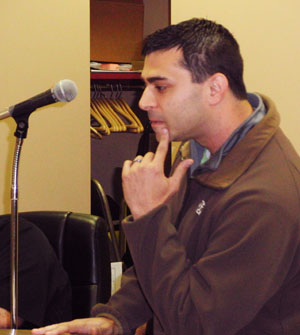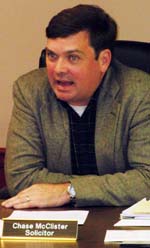
Michael Rizzo ponders as Kittanning Borough Solicitor Chase McClister explains how the borough will profit from investing paving money into the revitalization project.
by David Croyle
A resident of the Third Ward of Kittanning challenged Kittanning Borough Council members last night over borough money that is being allocated to the downtown revitalization project that was scheduled to be used to fix streets.
Michael Rizzo, a digital marketing director for a Pittsburgh-based advertising agency, questioned Council’s rationale in using money that was to be used for road repair as local match money required to obtain a million-dollar grant for revitalizing the downtown area.
“I wanted to know what their reasoning was to be taking money out of street paving which is desperately needed and allocating it to revitalization project. If you took a poll, 99% of the people in this town would rather have their streets paved than trees planted,” Rizzo said.
Rizzo compared the streets of Kittanning to those in third-world countries.
According to Jennifer Bellas in the Armstrong County Community Development office, a total of $340,000 was needed from the Borough in order to qualify for other monies. Kittanning authorized last month to take $140,000 that was allocated for paving in 2010, along with another $200,000 the Borough will receive in 2011 and 2012 from a Community Development Block Grant.

Solicitor Chase McClister said Kittanning Borough is actually making money by diverting paving money to the revitalization project.
Kittanning Borough Solicitor Chase McClister explained to Rizzo that because the Borough reallocated the paving funds, Armstrong County will give them pass-through money of $200,000 and Pennsylvania Senator Don White will arrange for another $50,000 from the state.
Rizzo said he understood the concept.
“(Kittanning Borough is) giving this $350,000 to the revitalization grant and they are going to get matching money back from the County to pave the streets. So they are saying they are actually gaining money from it. I asked them if it was a net-zero, and Chase McClister said, ‘No, it is a net-gain.’”
Rizzo said his main concern was the time table for turning the money around.
“I asked ‘When are we going to get this money back,’ and no one could adequately answer that. I would rather have the streets paved now.”
Council woman Lisa McCanna was encouraged by the Borough’s decision.
“We had a chance to get some things done. It’s not just planting flowers or pruning trees. What we have to do to get grant funds is to match funds. We have funding which we have planned for our roads, which is going to be matched by the county to fix the roads. But grant funding always needs a match. We are going to be able to move further beyond planting flower or trees. If you get a main street manager - a lot of small towns have gotten this. I don’t know if we are going to do it or not, but we will have funding. We’re not losing our funding for fixing the streets,” she said.
Rizzo challenged Council members, stating that he attended both meetings of the revitalization project and stated that none of the Council members was there.
“This money, from what I understood, could be used to build a business incubator or do other projects. No one from Borough Council was there and advocated for it to be spent any other way. I thought it was ironic that they would take money out of street paving and give it to (the revitalization project) without any strings attached. I am a little concerned that they didn’t put any stipulations on that kind of money,” Rizzo said.
McCanna brought up the fact that private donors were also contributing. McClister said that if the Borough had not provided match money, the private donors would not have provided extra funding as well.
Rizzo said diverting the funds could be risky.
“I am satisfied - if it works out, and the County gives us money back, and Kittanning actually makes money off of it the way Chase McClister explained it to me.”
Rizzo’s public comments were amid growing criticism over the Borough’s revitalization plans as a whole. He stated that beautifying downtown would be useless if there was no business to generate jobs.

